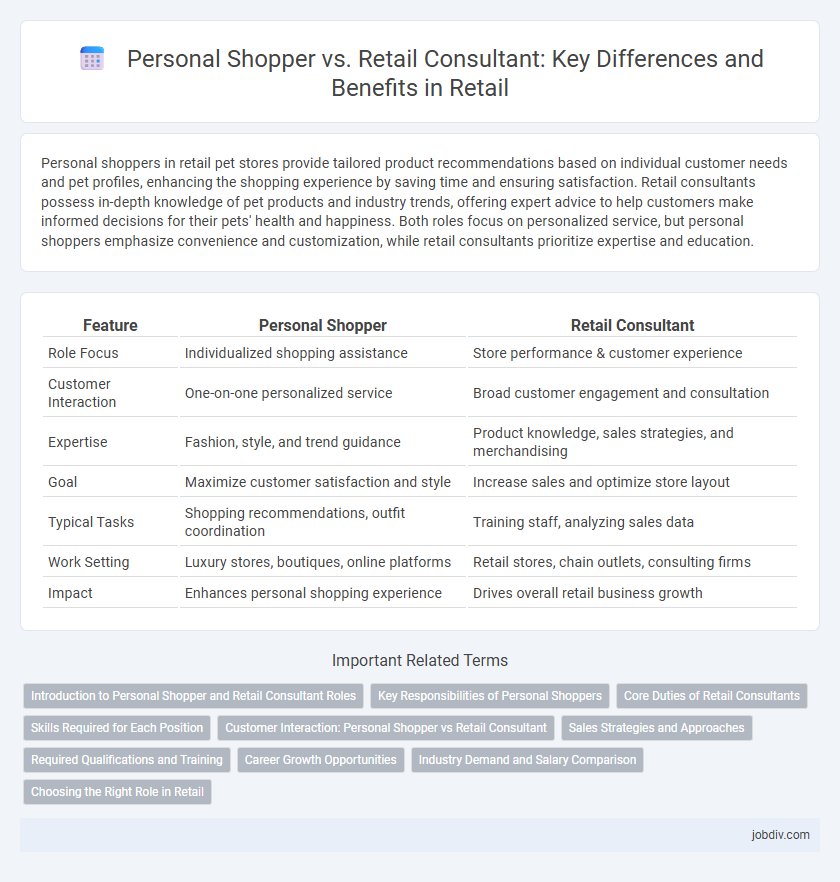Personal shoppers in retail pet stores provide tailored product recommendations based on individual customer needs and pet profiles, enhancing the shopping experience by saving time and ensuring satisfaction. Retail consultants possess in-depth knowledge of pet products and industry trends, offering expert advice to help customers make informed decisions for their pets' health and happiness. Both roles focus on personalized service, but personal shoppers emphasize convenience and customization, while retail consultants prioritize expertise and education.
Table of Comparison
| Feature | Personal Shopper | Retail Consultant |
|---|---|---|
| Role Focus | Individualized shopping assistance | Store performance & customer experience |
| Customer Interaction | One-on-one personalized service | Broad customer engagement and consultation |
| Expertise | Fashion, style, and trend guidance | Product knowledge, sales strategies, and merchandising |
| Goal | Maximize customer satisfaction and style | Increase sales and optimize store layout |
| Typical Tasks | Shopping recommendations, outfit coordination | Training staff, analyzing sales data |
| Work Setting | Luxury stores, boutiques, online platforms | Retail stores, chain outlets, consulting firms |
| Impact | Enhances personal shopping experience | Drives overall retail business growth |
Introduction to Personal Shopper and Retail Consultant Roles
Personal shoppers provide tailored shopping experiences by selecting products based on individual client preferences, style, and needs, enhancing customer satisfaction and loyalty. Retail consultants analyze store performance and customer behavior to develop strategies that increase sales, optimize product placement, and improve overall shopping experience. Both roles emphasize personalized service but differ in scope, with personal shoppers focusing on direct customer interaction and retail consultants concentrating on business growth and operational efficiency.
Key Responsibilities of Personal Shoppers
Personal shoppers specialize in providing tailored shopping experiences by understanding clients' preferences, style, and budget, delivering personalized product recommendations and exclusive selections. They manage appointments, coordinate wardrobe updates, and often offer after-purchase services such as alterations or styling advice. Their role emphasizes individualized attention and building long-term customer relationships to enhance satisfaction and loyalty.
Core Duties of Retail Consultants
Retail consultants primarily focus on analyzing consumer behavior and store performance to develop strategies that enhance sales and customer satisfaction. They provide expert advice on product selection, merchandising, and inventory management to optimize the retail environment. Unlike personal shoppers who assist individual customers, retail consultants work behind the scenes to improve overall store operations and profitability.
Skills Required for Each Position
Personal shoppers excel in personalized style assessment, product knowledge, and strong communication skills to tailor recommendations that enhance customer satisfaction. Retail consultants require expertise in inventory management, sales strategies, and customer relationship management to drive store performance and achieve sales targets. Both roles demand adaptability and problem-solving abilities, but personal shoppers emphasize individualized service while retail consultants focus on overall retail operations.
Customer Interaction: Personal Shopper vs Retail Consultant
Personal Shoppers offer highly personalized assistance by curating selections based on individual preferences and style, creating a tailored shopping experience. Retail Consultants provide expert product knowledge and solutions, guiding customers through options to meet specific needs and enhance satisfaction. Both roles emphasize customer interaction but differ in approach: Personal Shoppers focus on customization while Retail Consultants prioritize informed decision-making.
Sales Strategies and Approaches
Personal Shoppers prioritize personalized, client-focused sales strategies by curating tailored product selections based on individual preferences, enhancing customer satisfaction and loyalty. Retail Consultants employ a consultative approach, leveraging market analysis and consumer behavior insights to develop broader merchandising and sales techniques that drive overall store performance. Both roles utilize relationship-building and product expertise but differ in scale and personalization intensity within retail sales frameworks.
Required Qualifications and Training
Personal shoppers typically require strong customer service skills and product knowledge, often gained through retail experience or specialized short courses in fashion or merchandising. Retail consultants usually possess formal education such as a degree in business, marketing, or retail management, combined with professional training in sales strategies and market analysis. Both roles benefit from ongoing development in customer behavior, inventory management, and brand representation to enhance personalized shopping experiences and drive sales growth.
Career Growth Opportunities
Personal Shoppers typically specialize in personalized styling and customer-centric retail experiences, offering rapid skill development in fashion trends and client management. Retail Consultants gain broader expertise in sales strategies, inventory management, and operational processes, positioning themselves for leadership roles such as Store Manager or Regional Sales Director. Career growth for Retail Consultants often includes opportunities in business development and retail analytics, while Personal Shoppers may advance into luxury brand representation or exclusive client advisory positions.
Industry Demand and Salary Comparison
Personal shoppers and retail consultants both play vital roles in the retail industry, but demand for retail consultants is higher due to their expertise in sales strategy and customer relationship management. Personal shoppers typically earn an average salary ranging from $30,000 to $50,000 annually, while retail consultants often command higher wages, with salaries averaging between $50,000 and $75,000 depending on experience and location. Industry trends indicate growing demand for retail consultants as businesses prioritize personalized customer experiences and data-driven sales solutions.
Choosing the Right Role in Retail
Choosing the right role in retail depends on your skills and customer interaction preferences, with personal shoppers providing tailored, one-on-one styling and product recommendations, while retail consultants focus on broader sales strategies and inventory management. Personal shoppers thrive in environments emphasizing personalized service and fashion expertise, often boosting customer loyalty and satisfaction through customized experiences. Retail consultants excel in data-driven decision-making, merchandising, and training staff, ensuring overall store performance and meeting sales targets.
Personal Shopper vs Retail Consultant Infographic

 jobdiv.com
jobdiv.com